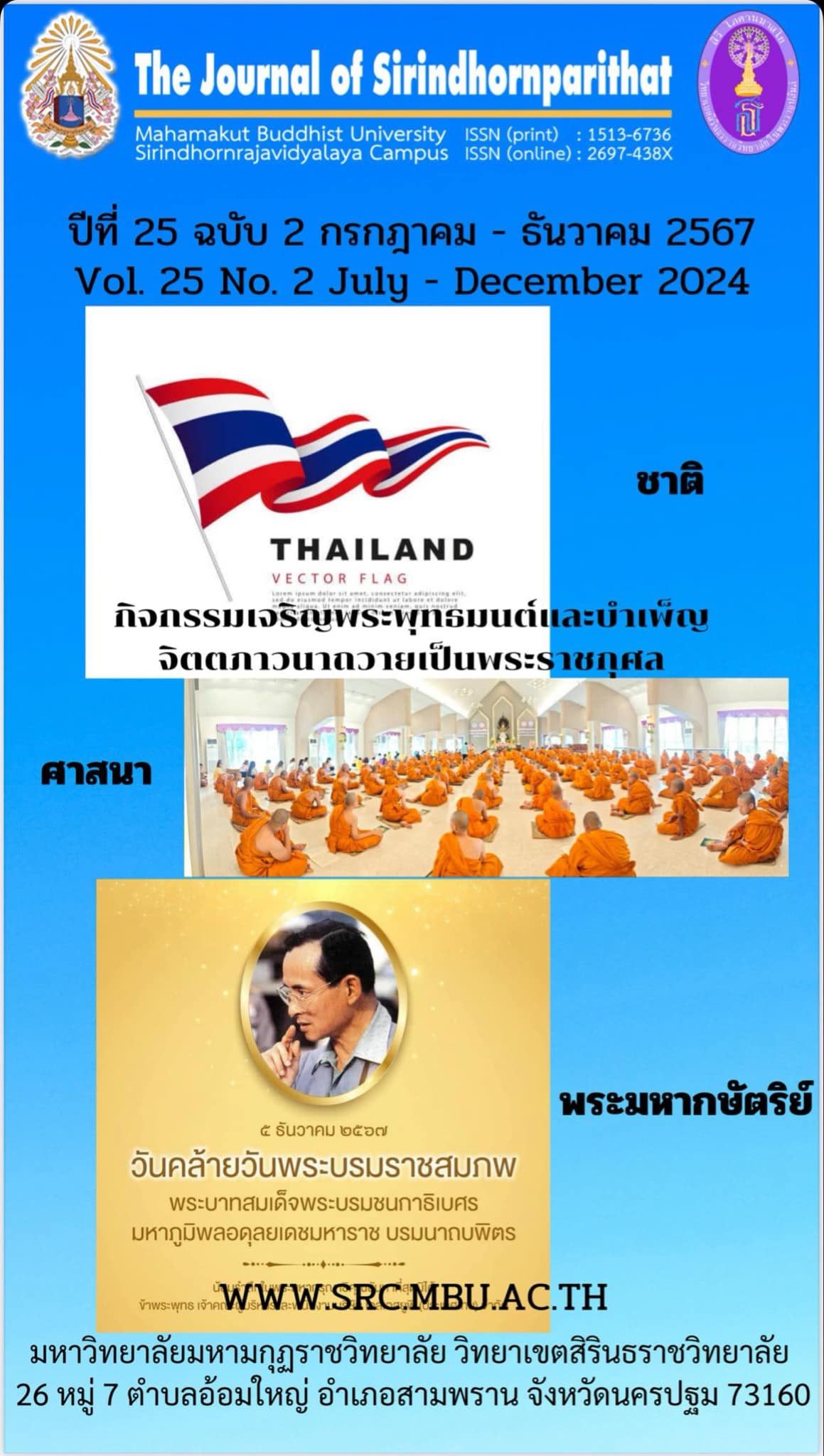ภาวะผู้นำเชิงกลยุทธ์ของผู้บริหารที่ส่งผลต่อประสิทธิผลของโรงเรียนสังกัดสำนักงานเขตพื้นที่การศึกษาประถมศึกษาสมุทรปราการ เขต 2
คำสำคัญ:
ภาวะผู้นำเชิงกลยุทธ์, ประสิทธิผลของโรงเรียน, โรงเรียนสังกัดสำนักงานเขตพื้นที่การศึกษาประถมศึกษาสมุทรปราการ เขต 2บทคัดย่อ
การวิจัยครั้งนี้มีวัตถุประสงค์เพื่อศึกษา 1) เพื่อศึกษาระดับภาวะผู้นำเชิงกลยุทธ์ของผู้บริหารโรงเรียนสังกัดสำนักงานเขตพื้นที่การศึกษาประถมศึกษาสมุทรปราการ เขต 2 2) เพื่อศึกษาระดับประสิทธิผลของโรงเรียนสังกัดสำนักงานเขตพื้นที่การศึกษาประถมศึกษาสมุทรปราการ เขต 2 3) เพื่อศึกษาภาวะผู้นำเชิงกลยุทธ์ของผู้บริหารที่ส่งผลต่อประสิทธิผลของโรงเรียนสังกัดสำนักงานเขตพื้นที่การศึกษาประถมศึกษาสมุทรปราการ เขต 2 กลุ่มตัวอย่าง ได้แก่ ครูผู้สอน จำนวน 315 คน ด้วยวิธีการสุ่มแบบแบ่งชั้น เครื่องมือที่ใช้ในการวิจัยได้แก่ แบบสอบถาม สถิติที่ใช้ในการวิจัยได้แก่ ความถี่ ร้อยละ ค่าเฉลี่ย ส่วนเบี่ยงเบนมาตรฐาน และการวิเคราะห์สมการถดถอยพหุคูณแบบเป็นขั้นตอน
ผลการวิจัยพบว่า
1. ระดับภาวะผู้นำเชิงกลยุทธ์ โดยภาพรวมมีค่าเฉลี่ยอยู่ในระดับมาก เมื่อมีการพิจารณาในรายละเอียด พบว่าอยู่ในระดับมากทุกด้าน ด้านที่มีค่าเฉลี่ยสูงสุด คือ ด้านมุ่งเน้นการปฏิบัติงานอย่างมีคุณธรรม ด้านที่มีค่าเฉลี่ยต่ำสุด คือ ด้านการกำหนดทิศทางเชิงกลยุทธ์
2.ระดับประสิทธิผลของโรงเรียน โดยภาพรวม มีค่าเฉลี่ยอยู่ในระดับมากที่สุด เมื่อพิจารณาตามตารางเป็นรายด้าน พบว่า ด้านผู้ปกครองและชุมชนเข้ามามีส่วนร่วม มีค่าเฉลี่ยสูงสุด ส่วนด้านส่งเสริมความมีปฏิสัมพันธ์ต่อกันแบบเป็นกลุ่ม มีค่าเฉลี่ยต่ำที่สุด
3.ภาวะผู้นำเชิงกลยุทธ์ส่งผลต่อประสิทธิผลของโรงเรียน สังกัดสำนักงานเขตพื้นที่การศึกษาประถมศึกษาสมุทรปราการ มีนัยสำคัญทางสถิติที่ระดับ .01 โดยมีโดยมีค่าสัมประสิทธิ์สหสัมพันธ์พหุคูณเท่ากับ.875 ตัวแปรที่มีอิทธิพลในการทำนายสูงสุด คือ ด้านมุ่งเน้นการปฏิบัติงานอย่างมีคุณธรรม (X4) รองลงมา ได้แก่ ด้านการจัดตั้งควบคุมองค์การให้สมดุล (X5) และทำนายต่ำสุดคือการบริหารทรัพยากรภายในองค์การ(X2) อย่างมีนัยสำคัญทางสถิติที่ระดับ 0.01 สามารถพยากรณ์ประสิทธิผลของโรงเรียน สังกัดสำนักงานเขตพื้นที่การศึกษาประถมศึกษาสมุทรปราการ เขต 2 ได้ร้อยละ 90.10
เอกสารอ้างอิง
จีระพันธุ์ พูลพัฒน์. (2553). พัฒนาการของการบริหารการศึกษาไทย. กรุงเทพมหานคร สำนักพิมพ์แห่งจุฬาลงกรณ์มหาวิทยาลัย.
นิติดล สิงห์เวียง. (2557). การศึกษาภาวะผู้นำเชิงกลยุทธ์ต่อการบริหารงานแบบมุ่งผลสัมฤทธิ์ของ บุคลากรเทศบาลนครพิษณุโลก จังหวัดพิษณุโลก. วิทยานิพนธ์รัฐประศาสนศาสตรมหาบัณฑิตมหาวิทยาลัยราชภัฏพิบูลสงคราม.
ธงชัย สันติวงษ์. (2554). พฤติกรรมบุคคลในองค์การ. กรุงเทพฯ: โรงพิมพ์เจริญพัฒน์.
พิมพรรณ สุริโย. (2551). ปัจจัยด้านผู้บริหารสถานศึกษาที่ส่งผลต่อประสิทธิผลโรงเรียน เทศบาลกลุ่มการศึกษาท้องถิ่นที่ 9 กรมส่งเสริมการปกครองท้องถิ่น. วารสารบัณฑิตศึกษา มหาวิทยาลัยราชภัฏวไลยอลงกรณ์ ในพระบรมราชูปถัมภ์
วิราพรดีบุญมี. (2557). ภาวะผู้นําเชิงกลยุทธืของผู้บริหารสถานศึกษาที่ส่งผลต่อประสิทธิ ภาพของโรงเรียนสังกัดเทศบาลนครขอนแก่น.วิทยานิพนธ์ศึกษาศาสตรมหา บัณฑิตมหาวิทยาลัยขอนแก่น.
สำนักงานคณะกรรมการพัฒนาการเศรษฐกิจและสังคมแห่งชาติ. (2562).ยุทธศาสตร์ชาติระยะ 20 ปี (พ.ศ.2561-2580). พิมพ์ครั้งที่ 2. กรุงเทพฯ : สำนักงานเลขานุการของคณะกรรมการ ยุทธศาสตร์ชาติ
สำนักงานเลขาธิการสภาการศึกษา กระทรวงศึกษาธิการ. (2560). แผนการศึกษาแห่งชาติ พ.ศ. 2560-2579. กรุงเทพ : สำนักงานเลขาธิการสภาการศึกษา.
Dess, G.G.,& Miller, A. (1993). Strategic management. Singapore McGraw-Hill.
Hitt, M. A, Ireland, R. D and Hoskisson, R. E. (2007). Management of strategy : Concepts and Cases.China .Thomson South-Wettern.
Sergiovanni, J. (1991). The principal ship: A reflective practice perspective. Boston: Allyn and Bacon.
ดาวน์โหลด
เผยแพร่แล้ว
ฉบับ
ประเภทบทความ
สัญญาอนุญาต
ลิขสิทธิ์ (c) 2024 มหาวิทยาลัยมหามกุฏราชวิทยาลัย วิทยาเขตสิรินธรราชวิทยาลัย

อนุญาตภายใต้เงื่อนไข Creative Commons Attribution-NonCommercial-NoDerivatives 4.0 International License.
บทความที่ได้รับการตีพิมพ์เป็นลิขสิทธิ์ของ มหาวิทยาลัยมหามกุฏราชวิทยาลัย วิทยาเขตสิรินธรราชวิทยาลัย
ข้อความที่ปรากฏในบทความแต่ละเรื่องในวารสารวิชาการเล่มนี้เป็นความคิดเห็นส่วนตัวของผู้เขียนแต่ละท่านไม่เกี่ยวข้องกับหาวิทยาลัยมหามกุฏราชวิทยาลัย วิทยาเขตสิรินธรราชวิทยาลัย และคณาจารย์ท่านอื่นๆในมหาวิทยาลัยฯ แต่อย่างใด ความรับผิดชอบองค์ประกอบทั้งหมดของบทความแต่ละเรื่องเป็นของผู้เขียนแต่ละท่าน หากมีความผิดพลาดใดๆ ผู้เขียนแต่ละท่านจะรับผิดชอบบทความของตนเองแต่ผู้เดียว




